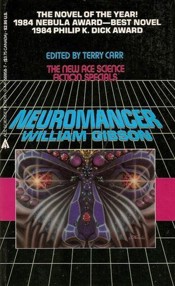Neuromancer

I tried to read this years ago, but didn’t get too far. It’s a weirdly tough read. I picked it up in an airport on the way home from a conference and tried again.
Gibson has an odd writing style. He’s done a lot of world-building, and he uses all sorts of nomenclature and jargon without much context. I guess he just expects that you’ll figure it out eventually. Sometimes you do, but sometimes you don’t.
I found an index of terms on a Reddit post, but finally made my way to full study guide on LitCharts which was a Godsend. I read the chapter summary after each, and used the term glossary to figure out what was going on.
Case is a once-renowned hacker who crossed the wrong person and lost his ability to connect to “the matrix.” Someone contacts him with a promise to fix this, if he helps them with a job. The job is a big one, involving a massive family corporation, a couple AIs, and an orbiting space station.
It needs to be said that this is the apparently book that coined the term cyberspace. The idea of moving through computer networks in an alternate reality was not really a known thing in 1984, so Gibson was breaking new ground here. He calls it call sorts of things in addition to the matrix and cyberspace. In the first chapter, he describes it thusly
Cyberspace. A consensual hallucination experienced daily by billions of legitimate operators, in every nation…
Since then, he’s said that he used the word because he felt it was basically meaningless and he could ascribe to it any meaning he liked.
In addition to heavy use of made-up jargon, Gibson can be very subtle. Sometimes, I would belatedly realize that something big had happened, and have to trace back to figure out what it was. Or I would read something in the LitChart summary and realize I had totally missed it.
I’m actually reading it again right now – I immediately restarted after I finished. This sounds dumb to say out loud, but it makes so much more sense the second time.
The ending is quite majestic, and gets into all sorts of questions like the nature of humanity itself, and the relationship of technology to the human body.
A classic novel. Absolutely worth reading (twice, even…)
Postscript
Added on
Sometime after reading the book, I listen to the BBS radio play from 2002 (here it is on YouTube). It was quite good. They simplified quite a bit by removing some subplots, but still very entertaining and faithful.
Book Info
- I have read this book. According to my records, I completed it on .
- A softcover copy of this book is currently in my home library.
Here are some notes I took on the acquisition of this book:
Bought it at the San Diego airport for the trip home from Opticon 2023.